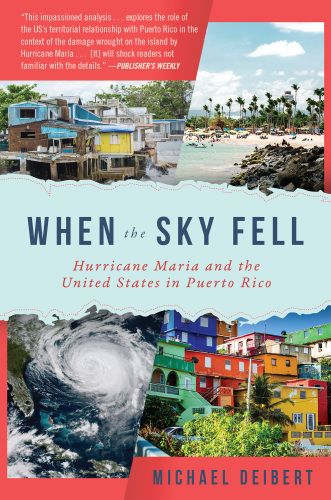
When the Sky Fell
Hurricane Maria and the United States in Puerto Rico
کتاب های مرتبط
- اطلاعات
- نقد و بررسی
- دیدگاه کاربران
نقد و بررسی

September 1, 2019
Following the disastrous aftermath of Hurricane Maria in Puerto Rico, journalist Deibert traveled to the islands to investigate the controversial, and underwhelming, aid efforts by the U.S. government. His account of the weeks and months following September 2017, when the hurricane hit, accompany a thoroughly researched history of Puerto Rico, both presented with the goal of helping readers better understand the ongoing impact of colonialism, and how the U.S. mainland responded to the hurricane's impact. Deibert begins by explaining the first European colonization led by Christopher Columbus. He then journeys through the region's complex shifts in power, revolutions, and natural disasters. This historical background takes up a significant portion of the book, with the final chapters touching on the relationship between the mainland and Puerto Rico, as it relates to the federal response to the hurricane. VERDICT Recommended for teen and adult readers interested in Puerto Rican history and the effects of colonialism, which continue to impact the present day.--Monique Martinez, Univ. of North Georgia Lib., Dahlonega
Copyright 2019 Library Journal, LLC Used with permission.

July 29, 2019
In this impassioned analysis, journalist Deibert (Haiti Will Not Perish) explores the role of the U.S.’s territorial relationship with Puerto Rico in the context of the damage wrought on the island by Hurricane Maria in 2017. Once a Spanish territory, Puerto Rico became a U.S. territory following the Mexican-American War, administered by a governor and an 11-member panel appointed by Congress. Deibert recounts a history of inhumane treatment and economic exploitation: thousands of Puerto Rican women were forcibly sterilized in the 1930s; workers received unlivable wages on the sugar plantations; and Puerto Ricans marching for workers’ rights and independence were continually met with brutal police violence until as late as 2007. All the while, the often-corrupt government and outside investors exploited the island’s resources and drove it into debt. The commonwealth’s second-class status—without independent finances or voter representation in the government controlling it, the island’s infrastructure had greatly deteriorated—rendered it unable to respond to the hurricane’s destruction, and the U.S. government failed to launch a significant relief effort for months. Deibert reports that, a month after the hurricane, 80% of the population was still without power, schools had not been reopened, and 5,000 people were still living in shelters. This grim account of the U.S.’s treatment of this territory will shock readers not familiar with the details.

























دیدگاه کاربران